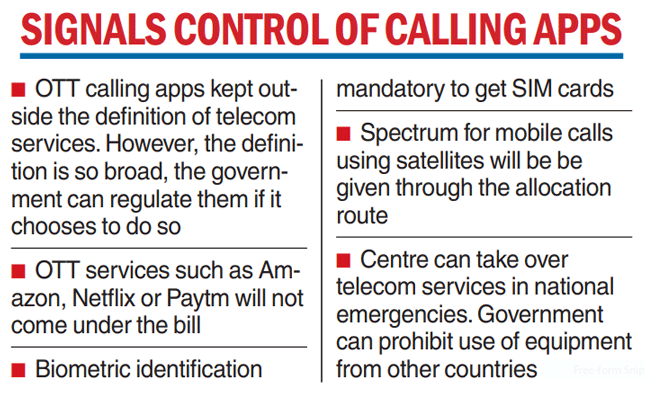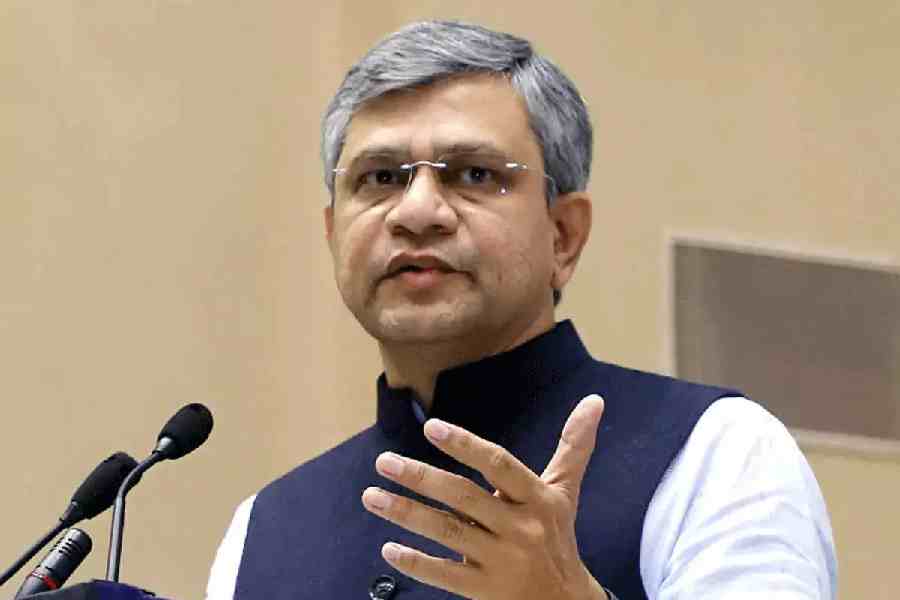The new telecom bill offers such a sweeping definition of telecom services that it gives the government the power to regulate WhatsApp, Telegram and Signal, without the bill even mentioning such OTT calling apps in its provisions.
Tabled on Monday in the Lok Sabha by communications minister Ashwini Vaishnaw, the Telecommunications Bill, 2023, also allows the government to temporarily take control of telecom services in the interest of national security, provides for the non-auction route for the allocation of satellite spectrum and makes it mandatory to use biometric identification before the issue of SIM cards.
BSP member Ritesh Pandey opposed the introduction of the bill as it was being brought in as a Money Bill and would not require approval of the Rajya Sabha.
The new bill seeks to repeal the Indian Telegraph Act, 1885, the Indian Wireless Telegraphy Act, 1933 and the Telegraph Wires (Unlawful Possession) Act, 1950.
The bill defines telecom services as the transmission of messages through wire or wireless technologies.
Analysts said the bill does "not mention specifically including OTT services" in the definition of telecommunication services, but, the language of the 2023 bill is "clearly expansive enough to include the same".
All of this brings messaging apps (such as WhatsApp and Telegram), email services (such as Gmail), and cloud services under the scope of telecom regulation.
However, it has not included over-the-top (OTT) services such as e-commerce (Amazon), entertainment (Netflix), payments (Paytm) in the definition of telecommunication services.
"The revised definition of 'telecommunication services' is wide and pervasive. As per Section 2 (d), an authorisation is required to provide such telecommunication services, which may extend to OTT platforms if the concerned statutory authorities decide that the aforesaid definitions, mean and include certain types of OTT services such as WhatsApp,” Abhay Chattopadhyay, Partner, Economic Laws Practice, said.
Telecom analyst Mahesh Uppal said “the bill is a poor solution to the challenges it seeks to address. It not only continues with an out-of-date licensing/authorisation regime but extends it to services and areas to which it did not apply in the past.
"The bill envisages an authorisation regime for OTT apps and services which were not regulated under the Indian Telegraph Act which it seeks to replace. It could be counterproductive to pass this bill without extensive review by an appropriate parliamentary committee,” he said.
The bill includes a provision mandating biometric identification by telecom companies (telcos) before issuing SIM cards to consumers.
"Any authorised entity which provides such telecommunication services as may be notified by the Central Government shall identify the person to whom it provides telecommunication services through use of any verifiable biometric-based identification as may be prescribed," the bill said.
An individual from the private sector can be eligible for the post of chairperson and member of the Telecom Regulatory Authority of India (Trai). At present, the eligibility for appointments is confined to specific government positions.
Satellite spectrum
The bill said certain satellite-based services such as global mobile personal communication by satellites, national long-distance and international long-distance, and mobile satellite service in L and S bands would be provided spectrum via administrative allocation.
This falls in line with the requests made by satellite communication projects such as Amazon’s Project Kuiper, Space X and Bharti Airtel-backed OneWeb which had been urging for administrative allocation in their responses to a consultation carried out by Trai.
The move rejects arguments made by domestic telecom players such as Jio and Vodafone Idea for the allocation of spectrum for commercial use through auction only.
Regulatory overlap
Analysts pointed out that the bill seeks to empower the government with the autonomy exercised by several regulators.
The powers of the central government under the telecom bill will extend to matters such as predatory pricing, sending of commercial communications through ‘specified messages’, encryption and data processing etc.
Harsh Walia, partner at Khaitan & Co., said “the excessive powers are given to the Central Government about these matters which are already regulated under existing laws, it will be important to see that there is no overlap between Department of Telecommunications with other regulators such as Competition Commission of India, Trai, ministry of electronics and information technology, etc.”
National security
The bill empowers the government to take control of the telecom services in the interest of national security.
The government can suspend or prohibit the use of telecom equipment from countries or a person as may be notified in case of national security.
Beside, telecom equipment needs to be procured from trusted sources.
In the event of an emergency, the government will also be entitled to block or intercept any message from a person or a class of persons or from any telecom equipment.
Individuals in such cases may be obliged to disclose all messages “in an intelligible format” to the officer mentioned in the government’s order.












